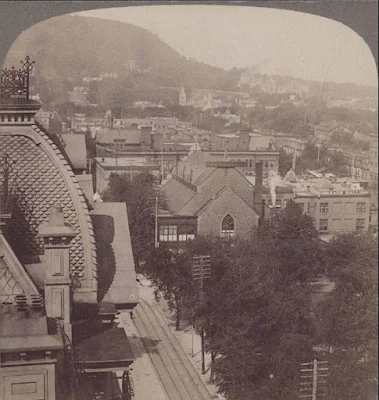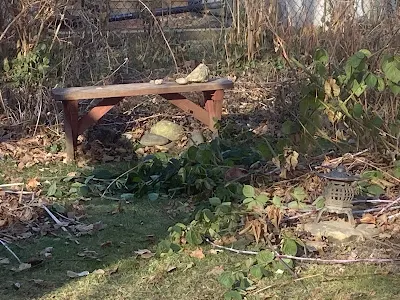 |
| Kathleen Raine |
Kathleen Raine's Autobiographies (1991) is made up of her three earlier autobiographical books published in the mid-1970s. I always underline passages in books that I am reading and I underlined passages--single words, phrases, sentences, and paragraphs--in Raine's book; later, it occurred to me to compile some of these passages on this blog, these are passages that deal with poetry and being a poet. But typing out these passages today I was surprised at Raine's prescient references to the dark age in which we now live. This is even more pertinent today when the world of order and stability seems to be unraveling; the old order is passing away and the new order seems barbaric and chaotic, anarchic in its worst sense, and everywhere we see the disintegration of values, order, and stability. The barbarians are entering the city and we, the inhabitants, know they have no good intentions for us, they want to destroy us and everything we represent. At least, that is how it seems in the days post October 7th when terrorists invaded Israel intent on killing, mutilating, and raping women, and then celebrating and advertising their violence. But I digress from Kathleen Raine’s Autobiographies; it is a beautifully written book and it should be of interest to those who want to know more about Raine's life, poetry, and ideas about life.
29 December 2023
Kathleen Raine on poetry and life:
My mother did not send me to school until I was six years old; and if I have been a poet I owe it to my mother's protection of my sanctuary of solitude in those years of early childhood when three small fields between the advancing fringe of London's East-End suburbs, and the wooden fence of Dr. Bernardo's Homes was space enough for earthly Paradise. (p. 50)
Conversely, in order to escape the silent demands of dignified and beautiful proportions, barbarians must desecrate and violate, smash the stained glass and deface the statues and paint defiant slogans on walls that tell us too clearly, in their beauty and harmony of proportion, that we might be better than we are. (p, 120)
Strange (so it seems to me, writing in 1974 of my youth nearly fifty years ago) that the very premises of civilization should stand in need of defense. (p. 123)
Let me say here, since I use the term the 'soul' very often, that I am perfectly aware of the possible alternatives, such as psyche, brain, drive, complex, ego, and the behaviousistic terms . . . I believed in the soul as that specifically human life in us of which the body is the vehicle. It seemed then self-evident that this represents our 'higher' nature, and no less self-evident that what passes in that living consciousness--that being in us which we immediately feel to be our 'I am"--is of greater import than our physical functions. The experiences of the soul, for good or ill, I still supposed made up the matter of poetry; and indeed of all the arts, these being the expression and the record of the soul's knowledge. (p. 138-139)
But I have been able to speak from my heart only in my poems. (p. 325)
...--and I do not enjoy that dropping of barriers of the world where 'poets' (usually very minor ones, for any serious artist must live a life in some sense disciplined) move to a kind of promiscuous gregariousness. ... The poet must protect his wildness as best he may, with whatever, camouflage he can create; a principle inherited from the shy animal world from a millennial past. And for a poet whose theme was the city, the city, also must be his protective disguise. (p. 329)
Art is the city of the soul. (p. 339)
I can now myself say that I have learned nothing from experience, from my mistakes, from trial and error, or from the mere passage of time: only through rifts in these clouds, as if from another order of knowledge altogether. Tragedies, after all, however nobly enacted and grandly endured, are, as seen by wisdom, the storms of illusion, the webs woven in ignorance and passion by those who 'do but slenderly know themselves'. In tragedy we can finally admire only the grandeur of humanity's never abandoned struggle to attain the moment of transcendence; without which there can be no catharsis, no liberation. (p. 344)
Of all the teachers of my generation I am perhaps most indebted to Jung. ... for Jung points the way to a living access to the originals of which myths and symbols of religion are formulations. (p. 351)
In the generation before my own, T.S. Eliot remained within the tradition he would have wished to see continue; he, and David Jones, were perhaps the last poets of that tradition. Yeats saw the darkness approaching, the tide rising; but his hope lay not in any turning or stemming of the tide, but in that which lies beyond civilization, the mystery of the gyres, the Indian Brahman whose outbreathings create worlds and whose inbreathings withdraw them from existence. But Yeats too was still among the artificers of Byzantium, the Graeco-Christian civilization, preserved in Ireland beyond its time elsewhere. It is my generation which has seen the end. (p. 356)
The great tree is at this time showering down its leaves in a process of death which cannot be arrested, and whose record is everywhere to be read in the nihilism of the arts, of social life, in a thousand images of disintegration, in the reversion of civilized society, it may be, to a state of barbarism. (p. 356)
But since it has been above all poetic truth I have followed, tried to discover always that good, that best Socrates never ceased to speak of, poetic justice it must have been (the only kind I have ever acknowledged) that brought me at last to stand my judgement in Greece itself. (p. 357)
The poets are always blamed, more or less, for the same thing: they are ruthless, or that which drives them is. (p. 363)
Raine, Kathleen. Autobiographies. San Rafael, Coracle Press, 1991.
.JPG)
.JPG)
.JPG)
.JPG)
.JPG)
.JPG)
.JPG)
.JPG)
.JPG)
.JPG)
.JPG)
.JPG)
.JPG)
.JPG)
.JPG)








.JPG)

















